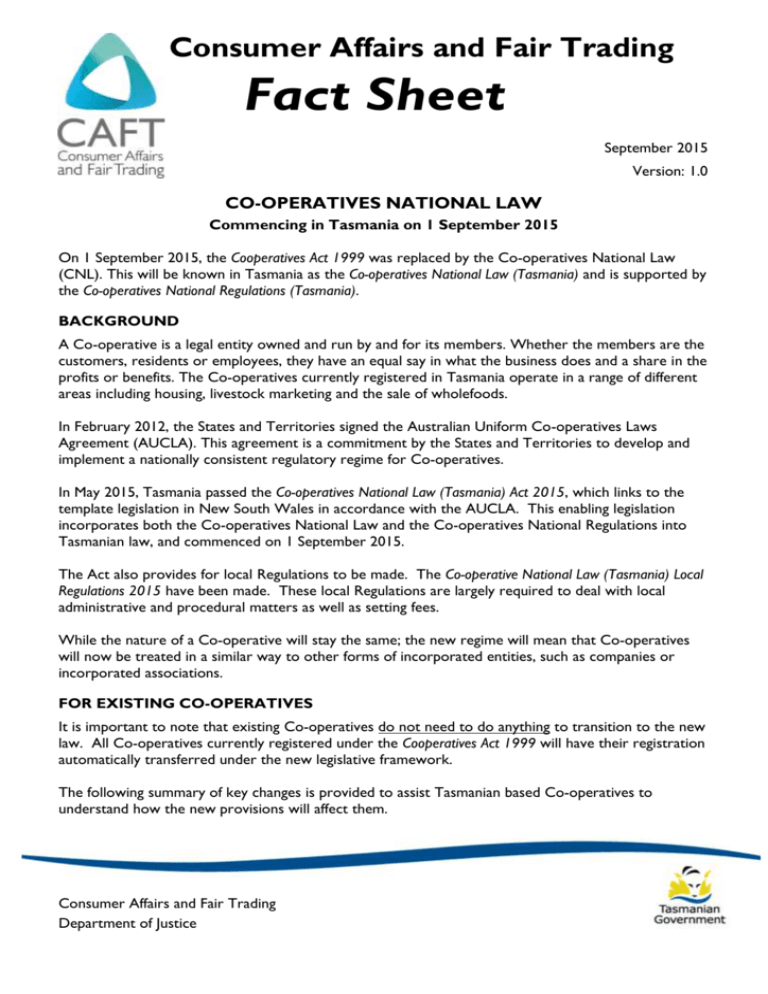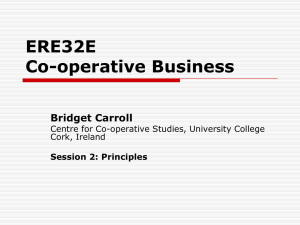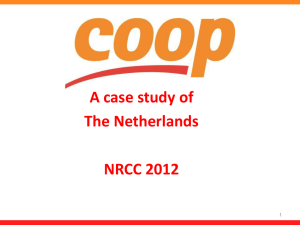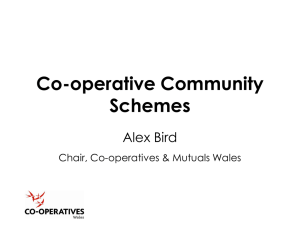Co-operatives national law - Consumer Affairs and Fair Trading
advertisement

Consumer Affairs and Fair Trading Fact Sheet September 2015 Version: 1.0 CO-OPERATIVES NATIONAL LAW Commencing in Tasmania on 1 September 2015 On 1 September 2015, the Cooperatives Act 1999 was replaced by the Co-operatives National Law (CNL). This will be known in Tasmania as the Co-operatives National Law (Tasmania) and is supported by the Co-operatives National Regulations (Tasmania). BACKGROUND A Co-operative is a legal entity owned and run by and for its members. Whether the members are the customers, residents or employees, they have an equal say in what the business does and a share in the profits or benefits. The Co-operatives currently registered in Tasmania operate in a range of different areas including housing, livestock marketing and the sale of wholefoods. In February 2012, the States and Territories signed the Australian Uniform Co-operatives Laws Agreement (AUCLA). This agreement is a commitment by the States and Territories to develop and implement a nationally consistent regulatory regime for Co-operatives. In May 2015, Tasmania passed the Co-operatives National Law (Tasmania) Act 2015, which links to the template legislation in New South Wales in accordance with the AUCLA. This enabling legislation incorporates both the Co-operatives National Law and the Co-operatives National Regulations into Tasmanian law, and commenced on 1 September 2015. The Act also provides for local Regulations to be made. The Co-operative National Law (Tasmania) Local Regulations 2015 have been made. These local Regulations are largely required to deal with local administrative and procedural matters as well as setting fees. While the nature of a Co-operative will stay the same; the new regime will mean that Co-operatives will now be treated in a similar way to other forms of incorporated entities, such as companies or incorporated associations. FOR EXISTING CO-OPERATIVES It is important to note that existing Co-operatives do not need to do anything to transition to the new law. All Co-operatives currently registered under the Cooperatives Act 1999 will have their registration automatically transferred under the new legislative framework. The following summary of key changes is provided to assist Tasmanian based Co-operatives to understand how the new provisions will affect them. Consumer Affairs and Fair Trading Department of Justice TERMINOLOGY CHANGES Trading Co-operatives are now known as ‘distributing Co-operatives’, and non-trading cooperatives as ‘non-distributing Co-operatives’. Co-operative federations are now known as ‘Co-operative groups’. NATIONWIDE REGISTRATION Under the old Tasmanian legislation, Co-operatives were registered in their State or Territory of origin and were limited to operating in that jurisdiction, unless they separately applied for registration in another jurisdiction/s. This requirement for separate registration in each State was time consuming and costly and could have deterred a group from electing to incorporate as a Co-operative. Under the CNL, a Co-operative that is legally registered in one jurisdiction can now operate on a national basis without needing to comply with registration or reporting requirements in each State. This is in line with the rights and obligations of companies under the Corporations Act 2001. REGISTRAR OF CO-OPERATIVES The new CNL establishes the role of Registrar of Co-operatives in each State. In Tasmania, this role will be undertaken by the Director of Consumer Affairs and Fair Trading, and is similar to the role the Director previously played under the Cooperatives Act 1999. Contact details for the Registrar are on the last page of this Fact Sheet. The Registrar has a range of administrative responsibilities under the CNL, including the assessment and approval of the rules of a Co-operative, and the subsequent registration and ongoing regulation of Co-operatives. A TWO TIERED SYSTEM – SMALL AND LARGE CO-OPERATIVES The previous Co-operative legislation in Tasmania did not differentiate between Co-operatives of various sizes. Under the new CNL, a two-tiered system has been created to allow for more appropriate financial reporting. Co-operatives are divided into ‘small Co-operatives’ and ‘large Cooperatives’ based on their size, membership, assets and fundraising activities. Small Co-operatives In general, a Co-operative is a small Co-operative if, in a particular year, it did not raise funds from the public issue of securities, and satisfies at least two of the following criteria: the consolidated revenue of the Co-operative and the entities it controls (if any) is less than $8 million for the previous financial year the value of the consolidated gross assets and the entities a Co-operative controls (if any) is less than $4 million at the end of the previous financial year PO Box 56, Rosny Park TAS 7018 Phone: 1300 654 499 Email: registration.services@justice.tas.gov.au Visit: www.consumer.tas.gov.au Page |2 the Co-operative and the entities it controls (if any) had fewer than 30 employees at the end of the previous financial year. Reports to members Small Co-operatives, not having a specific requirement in their rules, or required by the Registrar to have their accounts audited or reviewed, will now only need to submit an annual report to the Registrar. This includes small Co-operatives that are continuing to operate under the financial reporting provisions of the previous model rules. Small Co-operatives will be required to provide financial reports to their members, however this report will not need to be audited or reviewed (unless otherwise directed). The report will be fairly straightforward and include basic financial information, while adhering to relevant Australian accounting standards. Co-operative members who control at least 5% of the votes can request an audit or review. The Registrar can also require that an audit or review be undertaken. Of course, small Co-operatives can still choose to include additional financial reporting and auditing requirements above and beyond those required by the CNL as part of their rules. Annual returns Rather than having to provide full audited annual financial and Director’s reports, small Co-operatives will now need to provide a brief annual return to the Registrar. The information to be included in this annual return is set out in the Co-operative National Regulations, and will need to include basic information such as; confirmation of the details of the Co-operative, a statement that the Co-operative is still solvent, the number of members, and a statement indicating whether there has been a direction by members requiring any additional financial reports. Under the new system, small Co-operatives will have greater financial reporting requirements than a small proprietary company under the Corporations Act 2001. Public feedback on the CNL strongly indicated support from the sector to retain this higher level of reporting in order to uphold the Co-operative principles of member participation and democracy. Large Co-operatives A large Co-operative is defined under the CNL simply as any Co-operative that does not fit into the definition of a small Co-operative. Financial reporting and audit Large Co-operatives are required to prepare annual financial and Directors’ reports in line with part 3.3 Division 3 of the CNL. This reporting is comparable to the financial reporting requirements of companies under Part 2M.3 of the Corporations Act 2001. Large Co-operatives are also required to satisfy audit requirements as contained in the Corporations Act. PO Box 56, Rosny Park TAS 7018 Phone: 1300 654 499 Email: registration.services@justice.tas.gov.au Visit: www.consumer.tas.gov.au Page |3 Reports to members Large Co-operatives have a choice as to how they report to their members. They may either: provide a copy of each of the financial, Director’s and audit report to their members; or provide a concise report. If a concise report is provided, it needs to state that a member can still request a copy of the full reports if they wish. These reports must be provided to members free of charge. Reporting requirements Co-operative type Financial statements Annual reporting to Registrar Small Not necessary to provide financial statements unless a review or audit is required by the Registrar or is directed by members. Must lodge an annual return with the Registrar within five months of the end of the financial year. Large Must lodge with the Registrar: 1. Within three months after the end of the financial year if it is a disclosing entity Cooperative in terms of the Corporations Act. Must prepare or obtain financial reports and directors’ reports under Divisions 3-5 of the CNL and lodge them with the Registrar. The annual financial report consists of the: 2. Within five months after the end of the financial year for any other Co-operative. financial statements notes to the financial statements directors’ declaration about the statements and notes The directors’ report contains information about the operations of the Co-operative for the previous year. OTHER PROVISIONS REGARDING MANAGEMENT OF THE CO-OPERATIVE The CNL includes a variety of other provisions relating to the eligibility of an individual to be a Director and the duties of office bearers, including Directors, the secretary and other officers. These provisions are largely aimed at bringing the obligations of officers of Co-operatives in line with those of officers of companies under the Corporations Act 2001. NATIONAL REGULATIONS AND MODEL RULES PO Box 56, Rosny Park TAS 7018 Phone: 1300 654 499 Email: registration.services@justice.tas.gov.au Visit: www.consumer.tas.gov.au Page |4 The National Regulations provide a range of details to support the CNL, and automatically apply in Tasmania. The Regulations contain the definition of small Co-operatives, detail the required content of financial reports and outline the responsibilities of the secretary of a Co-operative. There are also requirements regarding fundraising, which bring Co-operatives in line with corporations law. The majority of the regulations are dedicated to setting out Model Rules. There are different Model Rules for: distributing Co-operatives with share capital distributing Co-operatives without share capital non-distributing Co-operatives. The Model Rules have been included to provide an example of what a suitable set of Co-operative rules might look like. A Co-operative may wish to avoid a lengthy process in drafting its own rules and simply fill in the details and adopt the appropriate Model Rules. On the other hand, a different Co-operative may wish to add further safeguards, reporting or requirements to the Model Rules to ensure members’ expectations are met. Either approach is fine, provided the final Rules include all the requirements of Schedule 1 of the CNL. The Registrar then assesses and approves a Co-operative’s rules as part of the registration process. It should be remembered that Co-operatives will retain the right to include requirements in their rules that are greater or more stringent than those in the Model Rules. The Model Rules have simply been drafted to demonstrate how the minimum requirements applying to a Co-operative can be met. REGULATIONS FOR LOCAL MATTERS As part of the transition to the CNL, the Co-operatives National Law (Tasmania) Local Regulations 2015 have been made to provide for Tasmania-specific matters, such as fees payable, exemptions and transitional arrangements for existing Co-operatives. In practical terms, from 1 September 2015, there will be different forms available on the Consumer Affairs and Fair Trading website for any applications and annual returns. There will also be different fees payable for various applications. These fees are consistent across jurisdictions and have been developed to reflect the costs of administering the legislation. PO Box 56, Rosny Park TAS 7018 Phone: 1300 654 499 Email: registration.services@justice.tas.gov.au Visit: www.consumer.tas.gov.au Page |5 WHAT WILL A CO-OPERATIVE NEED TO DO WHEN THE NEW LAW IS PASSED? Co-operatives currently registered in Tasmania, will be deemed to be registered under the new system. There will be no requirement to re-register. However, existing Co-operatives will need to assess whether their current reporting is in line with the new reporting requirements. If under the new legislation an existing Co-operative now falls under the definition of a ‘small Co-operative’ for a particular financial year, then that Co-operative may be able to reduce its annual reporting (unless its own rules state otherwise). Existing Co-operatives will also need to ensure that their rules include all prescribed matters included in Schedule 1 of the CNL. Schedule 1 is very similar to the existing provisions in the previous Tasmanian Co-operatives Act 1999; therefore Co-operatives that are compliant with the previous Act should have little, if anything, to change. Co-operatives with limited resources may consider adopting the appropriate new Model Rules as a way of ensuring ongoing compliance. Any group applying to be registered as a Co-operative after 1 September 2015 will need to comply with the new requirements in order to be granted registration. FURTHER INFORMATION Further information about the Co-operatives National Law can be found on the website: www.consumer.tas.gov.au/registrations/co-operatives For access to forms and fees: www.consumer.tas.gov.au/forms_and_fees CONTACT DETAILS: Consumer Affairs and Fair Trading 30 Gordons Hill Road ROSNY PARK, TAS 7018 Mail: Phone: Email: Website: PO Box 56 Rosny Park TAS 7018 1300 654 499 registration.services@justice.tas.gov.au www.consumer.tas.gov.au This document has been produced and published by the Consumer Building and Occupational Services Division of the Department of Justice. Although every care has been taken in the production of the work, no responsibility is accepted for the accuracy, completeness, or relevance to the user's purpose, of the information. Those using it for whatever purpose are advised to verify it with the relevant government department, local government body or other source and to obtain any appropriate professional advice. The Crown, its officers, employees and agents do not accept liability however arising, including liability for negligence, for any loss resulting from the use of or reliance upon the information and/or reliance on its availability at any time. PO Box 56, Rosny Park TAS 7018 Phone: 1300 654 499 Email: registration.services@justice.tas.gov.au Visit: www.consumer.tas.gov.au Page |6







